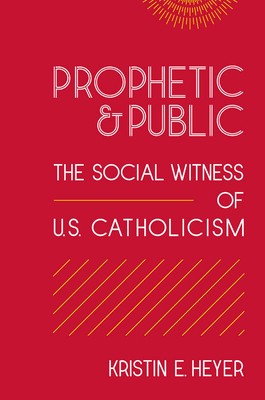
- We will send in 10–14 business days.
- Author: Kristin E Heyer
- Publisher: Georgetown University Press
- ISBN-10: 1589010825
- ISBN-13: 9781589010826
- Format: 15.3 x 23 x 1.6 cm, softcover
- Language: English
- SAVE -10% with code: EXTRA
Reviews
Description
If faithful Catholics are called to be a light to the world, how should they make their faith known? What sort of public witness best reflects authentically Catholic behavior? Christians through the ages have faced a dilemma: if you want to remain morally pure, you'll have no impact on the system; but if you try to change the system, you'll compromise your moral purity. So while an ethicist such as Michael Baxter--one of the figures Heyer discusses--claims that the most important thing the church can do is to be prophetic, and champion nonviolence, and not get its hands dirty in politics, that's fine--but that speaks to only one aspect of what it means to be Catholic. Similarly, while the U.S. Conference of Catholic Bishops--which Heyer also discusses--can forumulate brilliant philosophical pronouncements and policies on just warfare, say, that recognize the role of government, they, too, are speaking to one side of the faith spectrum. Both sides are witnessing to their faith, and both are genuinely Catholic, but both sides are incomplete. Heyer looks at two prominent Catholics--Baxter and Bryan Hehir--as well as three Catholic social justice organizations--NETWORK, Pax Christi USA, and the U.S. Conference of Catholic Bishops--and demonstrates how their differing methods of public witness are both legitimate and complementary. Catholics, Heyer writes, should recognize and appreciate that there is no single, correct means of public witness.
EXTRA 10 % discount with code: EXTRA
The promotion ends in 19d.11:57:06
The discount code is valid when purchasing from 10 €. Discounts do not stack.
- Author: Kristin E Heyer
- Publisher: Georgetown University Press
- ISBN-10: 1589010825
- ISBN-13: 9781589010826
- Format: 15.3 x 23 x 1.6 cm, softcover
- Language: English English
If faithful Catholics are called to be a light to the world, how should they make their faith known? What sort of public witness best reflects authentically Catholic behavior? Christians through the ages have faced a dilemma: if you want to remain morally pure, you'll have no impact on the system; but if you try to change the system, you'll compromise your moral purity. So while an ethicist such as Michael Baxter--one of the figures Heyer discusses--claims that the most important thing the church can do is to be prophetic, and champion nonviolence, and not get its hands dirty in politics, that's fine--but that speaks to only one aspect of what it means to be Catholic. Similarly, while the U.S. Conference of Catholic Bishops--which Heyer also discusses--can forumulate brilliant philosophical pronouncements and policies on just warfare, say, that recognize the role of government, they, too, are speaking to one side of the faith spectrum. Both sides are witnessing to their faith, and both are genuinely Catholic, but both sides are incomplete. Heyer looks at two prominent Catholics--Baxter and Bryan Hehir--as well as three Catholic social justice organizations--NETWORK, Pax Christi USA, and the U.S. Conference of Catholic Bishops--and demonstrates how their differing methods of public witness are both legitimate and complementary. Catholics, Heyer writes, should recognize and appreciate that there is no single, correct means of public witness.


Reviews